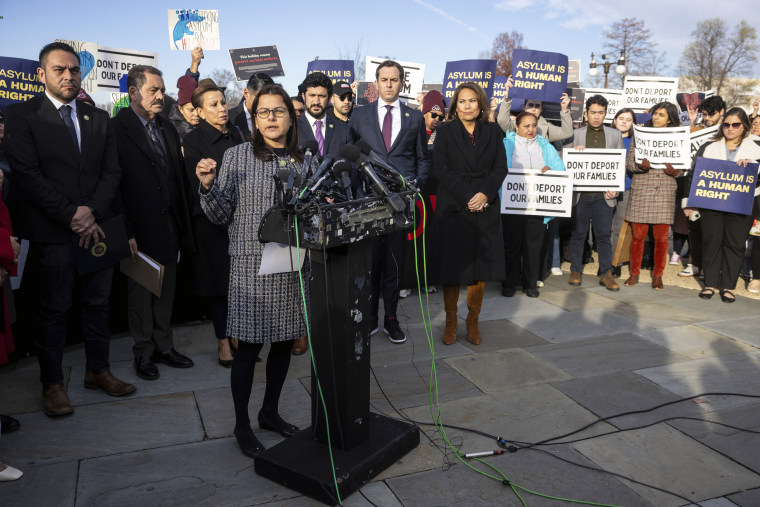WASHINGTON — The White House met with leaders of the Congressional Hispanic Caucus on Saturday, a conversation the Democratic lawmakers had been seeking for weeks as they became increasingly concerned that the administration would agree to an immigration deal that they found unacceptable.
The meeting occurred on Zoom on Saturday afternoon, according to two people familiar with the discussions, and involved leaders and senators in the caucus, White House chief of staff Jeff Zients and Homeland Security Secretary Alejandro Mayorkas.
At issue is what Democrats are willing to agree to on border measures in order to gain the support of Republicans to pass aid for Ukraine and Israel, which remains a top priority for President Joe Biden.
The White House told the CHC members that while progress had been made on a framework, they were still working through some important policy decisions, according to one of the sources. The CHC also asked to be able to weigh in before the White House sealed the deal on negotiations; Zients and Mayorkas said they would brief them again.
CHC members’ frustrations grew in recent weeks as members felt like the White House wasn’t listening to their concerns. The caucus had demanded an “urgent” meeting with the White House earlier this month.
Last month, on at least two occasions, Democratic senators in the CHC huddled with Senate Majority Leader Chuck Schumer, D-N.Y., and said they did not believe Republicans were negotiating in good faith, according to two sources familiar with the meeting.
Their dissatisfaction came out during Saturday’s meeting, when they made clear they were upset at both the policy and the communication around the border deal, according to the source in the meeting. They said they felt like the White House dragged its feet on granting the group a meeting until the administration was closer to approving provisions they weren’t going to support.
A senior administration official previously told NBC News that top Biden aides had prioritized communication with lawmakers directly involved in the negotiations — including Schumer and Sens. James Lankford, R-Okla., Chris Murphy, D-Conn., and Kyrsten Sinema, I-Ariz. — and started to expand its outreach this past week.
Zients has also held several calls with CHC members.
On Thursday in the daily press briefing, White House Press Secretary Karine Jean-Pierre insisted that they had been "in constant communication with Democrats and, obviously, the Congressional Hispanic Caucus."
"Look, here’s what the President believes: He believes we need to fix what’s happening at our — with the broken immigration system. He believes that that needs to get done, that needs to get fixed," she said. "And he’s willing to find a bipartisan compromise to get that done."
“The White House and the Administration have not been in constant communication with the CHC on these negotiations and their involvement," CHC Chair Rep. Nanette Diaz Barragán, D-Calif., said in a statement to NBC News. "As a matter of fact we’ve been the ones asking for meetings for weeks with the White House and Administration officials involved in the talks, as well as the President — and the White House has not been very responsive to our requests.”
Senate negotiators met Saturday to continue hammering out a deal on the border, with the goal of having a framework in place by Monday.
But according to two sources with knowledge of the discussions, Democrats and Republicans remain far apart in three key areas: restricting the president’s ability to temporarily admit refugees under humanitarian parole, mandating the detention of migrants pending the adjudication of their claims, and expanding presidential powers to expel migrants nationwide.
Immigration advocates were furious about the deportation proposal this past week, comparing it to Title 42, the Covid-era public health order implemented by former President Donald Trump that made it easier for the U.S. to expel migrants. The pro-immigration group FWD.us called the latest proposal “Title 42 on steroids.”
The Senate — which is controlled by Democrats, who have shown more interest in quickly passing the broader aid package — has delayed its holiday recess and will return on Monday in hopes of hammering out a deal.
Senate Minority Leader Mitch McConnell, R-Ky., sent a note to his GOP members informing them that while negotiators are making progress toward a deal on immigration reform, they are not there yet, and there will likely not be a vote this coming week.
"While there is progress being made in the border discussions there are significant issues still under discussion and a lot of very technical work on drafting which takes time to get right. So, it looks like we are headed into votes on nominations this week," he wrote in his note.
"This will go into next year," Sen. Lindsey Graham, R-S.C., said on NBC News' "Meet the Press." "We feel like we're being jammed. We're not anywhere close to a deal. It will go into next year."
The House, however, left on Thursday and has no plans to return until the new year.
"We have needed comprehensive immigration reform in this country for decades. And because it’s so hard, it’s so emotionally charged. We never get it done. We don’t get it done," Rep. Debbie Dingell, D-Mich., said on NBC News' "Meet the Press."
"We need to do something on immigration, but we need to do it in the right way. That would keep compassion there but protect our national security."



